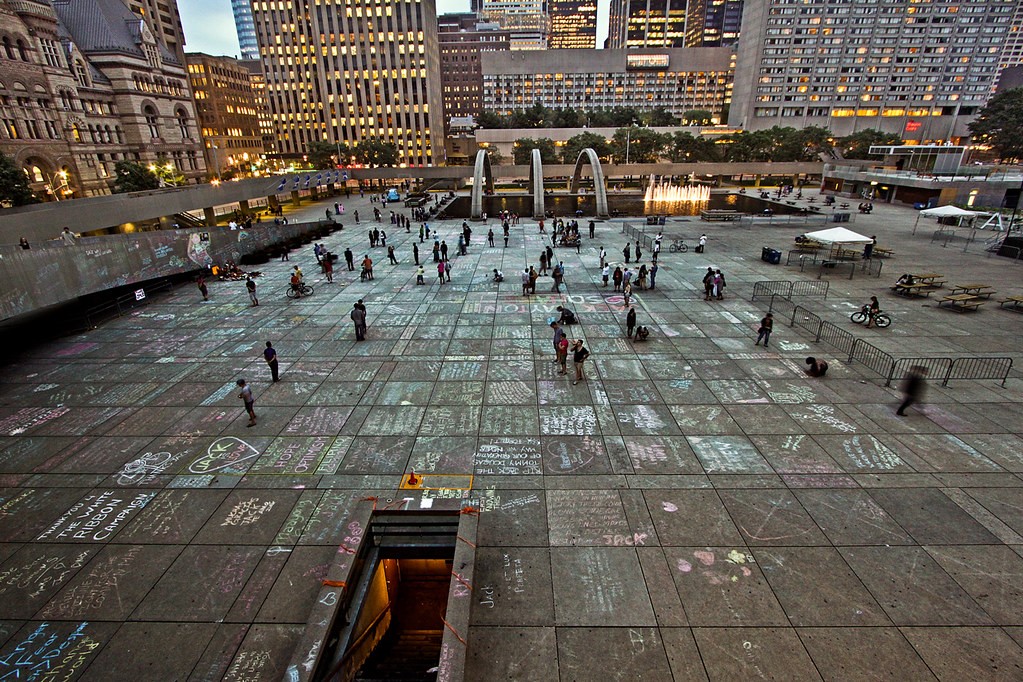Cultural rights and public spaces
Special Rapporteur in the field of cultural rights
Issues pertaining to public spaces have been raised by a variety of stakeholders and from different perspectives. However, much of this work is sector specific and not holistic or human rights based.
Public spaces are greatly important for the enjoyment and exercise of human rights in general, and are particularly relevant for cultural rights. As spaces created, maintained, secured, developed and managed by public authorities, policymaking regarding those spaces should follow a human rights approach.
Below, you will find the thematic work conducted by the mandate over the years on the impact of policies and practices in the management of public space on cultural rights, as well as developments in other parts of the UN system and important links.
Reports
The importance of public spaces for the exercise of cultural rights (2019)

Nathan Phillips Square, Toronto, is a site of political demonstrations and rallies, public memorials, and arts and cultural celebrations, operating as a space for most public discussions, conversations, actions and even emotions. Photo © Jackman Chiu on flickr.
In her 2019 thematic report to the General Assembly, the Special Rapporteur considered how actors from across the cultural ecosystem access and use public spaces, identified the challenges they face and the strategies they develop to overcome them, and analysed the impact this has on their cultural rights (A/74/255).
What public spaces are concerned?
The term "public spaces" aims at underlining the plurality and diversity, and the differences in nature and scope of these spaces. Public spaces may include not only urban but also rural and natural spaces, and real and virtual spaces.
In order to get a wide array of views and learn from a variety of experiences about the human rights impact of policies regarding public spaces, the Special Rapporteur disseminated a questionnaire in May 2019. See the report page for more information.
The impact of advertising and marketing practices on the enjoyment of cultural rights (2014)
In her 2014 report to the General Assembly, the Special Rapporteur sought to identify main challenges and obstacles posed by advertising and marketing practices to the enjoyment of cultural rights, including the right to education, the right to artistic freedom, the right to enjoy and access cultural heritage and the right to choose one's way of life (A/69/286).
What advertising and marketing practices are we talking about, and how are they human rights issues?

Larger that life advertisement dominating a sport ground in China. © Gwenaëlle Gobé, This Space Available, with the courtesy of the author.
Advertising and marketing practices encompass a diversity of trends and methods used to sell or promote services or products including print, TV, radio, internet and billboards, branding, promotions, and sponsorship of cultural events or products, among other strategies. They also include the development of new practices linked to behavioural targeting and neuromarketing
These practices have an impact on the enjoyment of a series of human rights, including on freedom of thought, opinion and expression, cultural diversity and ways of life, the rights of children with respect to education and leisure, academic and artistic freedom and the right to participate in cultural life and to enjoy the arts.
See the report on the impact of advertising and marketing practices on the enjoyment of cultural rights.
In order to identify main challenges and obstacles posed by advertising and marketing practices to the enjoyment of cultural rights, including the right to education, the right to artistic freedom, the right to enjoy and access cultural heritage and the right to choose one's way of life, the Special Rapporteur prepared a questionnaire and disseminated it in December 2013. See more information and consult the responses received on the impact of advertising and marketing practices on the enjoyment of cultural rights on the report page.
Related events and materials
- Interview of the Special Rapporteur (in French), explaining the focus of her report on public spaces, New York, 22 October 2019
- Short video « C'est dans les espaces publics que la vie culturelle prend forme », 22 October 2019
- UNICEF research and workshops on marketing and brand presence in schools, since 2016
- Feature story: Protecting cultural rights from excessive advertising, 17 December 2015
Useful links
- Global Platform for the Right to the city
- Human Rights Committee, Final Observations addressing issues relating to public spaces:
- restriction of public meetings: see CCPR/C/SDN/CO/5, para. 45;
- closing down of public space through suspensions of social media: see CCPR/C/COD/CO/4, para. 39;
- prior authorization regimes for public gatherings: see CCPR/C/MAR/CO/6, para. 45;
- non-inclusion of sexual harassment in public spaces in a sexual harassment bill: see CCPR/C/JAM/CO/4, para. 23
- Manifeste pourla création artistique dans l'espace public, Fédédation nationale des arts de la rue, janvier 2017
- Special Rapporteur on the right to freedom of peaceful assembly and of association
- United Cities and Local Governments, Committee on culture
- United Nations Human Settlements Programme (UN-Habitat), Global Public Space Toolkit: From Global Principles to Local Policies and Practice(2015)
- UN-Women, "Safe cities and safe public spaces: global results report", 2017